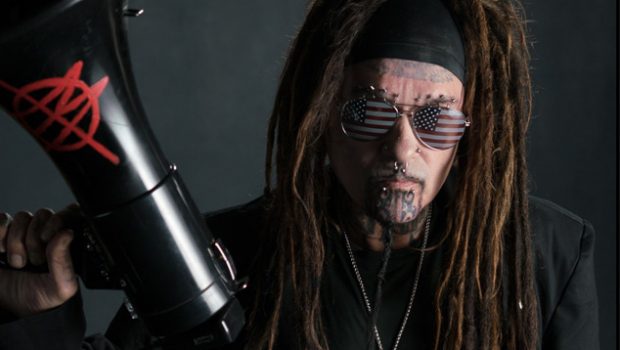Ministry’s Al Jourgensen On The New “AmeriKKKant” Album, Steven Spielberg, Zero Day & More
Without Ministry ringleader Al Jourgensen, there would probably be no such thing as industrial music. Without that industrial genre, Trent Reznor and Nine Inch Nails probably would not have existed, nor probably would have White Zombie or Rammstein. Beyond Ministry, Jourgensen has also been prolific with other bands and studio projects, including the Revolting Cocks, Lard, and Surgical Meth Machine. And beyond the music, Jourgensen is generally considered — by rock fans and critics alike — to be one of the most original, intelligent and forward-thinking individuals to ever take a stage.
The controversially-titled AmeriKKKant is the latest album from the newly-regrouped Ministry. Released last month, AmeriKKKantfeatures appearances from DJ Swamp, N.W.A. associate Arabian Prince, and Fear Factory’s Burton C. Bell. Reportedly, Bell and DJ Swamp will be part of Ministry’s touring lineup — its North American tour kicked off on March 22nd at the House Of Blues in Anaheim — as will former Slipknot drummer Joey Jordison, Static-X bassist Tony Camps, Killing Joke keyboardist John Bechdel, and long-time Ministry guitarists Sin Quirin and Cesar Soto.
I had the pleasure of speaking with Mr. Jourgensen, and highlights of our chat are below. More on Jourgensen, AmeriKKKant and Ministry can be found online at www.ministryband.com.
Al Jourgensen: No.
It has a great chapter on you and Steven Spielberg and how you’d originally come to meet him, and it showed a side of you that’s very funny and witty that I don’t think everyone always knows about. Can you tell me a little bit more about your relationship with Steven Spielberg? Is that something you’ve ever been public about?
Al Jourgensen: Yeah, a little bit. I’m actually friends with Stephen in a sense. I mean not “friends,” we don’t hang out, but it got off to a pretty rocky and dodgy start…
Originally I was approached to do that movie [A.I.] and the soundtrack to it by Stanley Kubrick, who was the original director of that movie. So I’d been working with the A.I. people for a while, projecting what I was going to do and how we’re going to go about some of the scenes. I got the original script and all this, and then he [Kubrick] died suddenly and Steven Spielberg picked up the movie… Trust me we’re not his first choice, he’s only ever worked with John Williams on his music scores, so we’re kind of like this freaky thing to him.
We got in there and they dressed us up in these you know crazy dystopian post-apocalyptic outfits that they had to send for the movie. I’d already sent my music in, which John Williams hated. So it wasn’t a very good start, and we were on set for four days and Spielberg hadn’t talked to us. Then they lined us up, the band, like we are meeting the f**king queen or something where like they gave us a preparation of “Don’t talk to him unless you’re talked to first. Never look him in the eye.” This kind of bulls**t, and it happens to be that I was the last one in line. So he went down and shook hands of all the band members and said “Welcome aboard.” He was all nice and, you know, “nice little welcome wagon” there.
Then he got to me and I said, “Hey Steven, baby, dude, I think this band has to walk on this movie. We can’t do this part for you because Kubrick told me that it was a porno film and “A.I.” stood for “Anal Intruder” and we were here for a porno film. It’s got these f**king teddy bears and these kids running around acting and he made it like this E.T. clone movie and we’ve got to walk.” I was actually just kidding, I was trying to break the ice, but he freaked out and went running off and his handler with a clipboard was right behind him, going “I will take care of it Mr Spielberg.” He came back and said, “You know I’d take you out.” I was like ‘I don’t give a f**k, f**k you.” Then the next day we came in and he was laughing his ass off at the fact that I thought the name of the movie was “Anal Intruder” instead of “Artificial Intelligence.”
So Spielberg would come up to me every day and give me a new “A.I.” thing and we kind of hit it off after that. But at first it was kind of snarky.
I know we are here to talk about your new album, and something that amazes me about the new album is that it’s continuous. Are you planning on playing it that way live on this upcoming tour?
Al Jourgensen: Well, actually we’ve been forbidden to do that. That was my first choice but apparently because of the way society is, that people don’t have the attention span to sit through the whole thing. But just between you and me, as if it’s not going into print or anything, we’re going to do the whole f**king album. I mean, f**k them, but we will intersperse it with some of the older songs that people know so they don’t freak out and all this, because it’s kind of a tired commentary on the way society has gotten.
We’re just so used to like… The biggest thing of your f**king day is seeing a cat playing piano on YouTube and sharing it and see how many likes you get. That probably takes up half your f**king day, you know, “Oh my god they liked it, I shared it, they like me, they really like me, oh I love that cat playing piano.” They don’t have time to actually sit through a narrative, 48 minutes which is what this album is, the story, it is a snapshot… If you watch Black Mirror, it’s just kind of like watching an episode of Black Mirror. And those are about 56 minutes long, this is 48 minutes long and it is the narrative that tells kind of a story. The story is the snapshot that I took of society that’s going on right now, which is so much more than Trump.
I know that is all we get on the news feeds, it is Trump this, Trump that, Trump said this, Trump Trump Trump. Trump has nothing to do with it, what is far more interesting to me is a society that would think that it’s a good idea to elect Trump knowing what we knew about him already, that to me is the crux of the biscuit. That’s what this album is about, Trump is just like a cyst that pokes out with a real malignant cancer. You can remove the cyst, you still have the cancer.
Al Jourgensen: Oh, thank you. Well, there is only one method to my madness, and that is, it is complete madness in the sense that there is no complete way of doing things. For instance, this time we had riffs together, I would say about 70 percent of the album, or 80 percent of the album was written in one week of just an actual band — my Ministry band that we tour with, going into the studio and just coming up with riffs — and then for the next five months after that one week we start like enhancing those riffs and telling a narrative. We start telling the story after we get the basics done, but we haven’t done it that way since I think the last album that we did it with the full band in the studio. That was probably Filth Pig in ’93 or ’94, the last time I had access to an entire band and people that I thought were really great artists that I could work with at one time.
Then after that we interspersed over the next five months. Burton Bell, Arabian Prince or DJ Swamp, people like that come in for a day or two. Then we kind of tailor the songs around their talents, which is also collaborative instead of just saying, “Alright, you play this within this format.” It was more like, “Hey man, here is our format, what do you want to do with it?” Then we’d let them run with it. It’s much more collaborative, like I said, than anything we’ve done since probably about Filth Pig.
The three artists you just mentioned, Burton, Arabian Prince and DJ Swamp are three artists from totally different genres. Did you feel pressure to make this sound heavy like a Ministry album?
Al Jourgensen: No, at my age, the only pressure you get is to make sure you poop regular and pee regular. It is like, there is no musical or social pressure that could make me do anything that I didn’t want to do anyway. At sixty years old, you start really worrying about like just staying healthy if you will, and mental health is… At this point if you don’t have it, you’re never going to have it, so these weren’t really thoughts in my head of like trying to cater anything to them. They wouldn’t be in our room if they weren’t considered really respected artists in the first place.
What’s funny is that for instance in the case of DJ Swamp and Arabian Prince, I had no idea what they had done before, I just met these people and thought they were really cool. In the case of Lord Of The Cello, who opens up the album with his wonderful cello playing, I talked to him and found him basically at a flea market in Los Angeles busking for tips. He’s not been in a band or anything before, so there really isn’t pressure, it was just trying to convey the right feeling that you wanted for the record that you wanted to make.
When you took a hiatus about a decade ago, you said that making a Ministry album was five times harder than everything else. You had said that other bands that you recorded with, it was much easier and you could do you know three of those records for the same amount of work as Ministry. Was this one as hard to make as prior efforts?
Al Jourgensen: Actually no, I had a couple catalysts for it. Number one, November 9th, 2016, we got the angry Cheeto Jesus and his presidency which made me decide that society has reached a long breaking point to think that this is a good idea. So that was the catalyst to get it started.
And then, like I said since Filth Pig, we haven’t had really a collaborative effort like we’ve had on this record. Since Filth Pig, but like ever since then it’s been kind of like “me against the world,” and this time it was like me and my amigos against the world. So it actually made it easier, this record was done from start to finish within six months and, like I said, most of the music was actually written within the first week with the actual band just jamming and coming up with ideas.
Al Jourgensen: A little bit of both. I am informed about all of them and the ones that people around me think might catch my attention, and then I delve into wholeheartedly and try and understand them, but do I search the web every morning and all this shit, no. But there are certain things, like for instance, like today, page 29 or something of the New York Times has an article about Cape Town, South Africa, a place that I’ve been to. I really love enjoyed Cape Town and it is now nearing “zero-day” which is April 29th. “Zero-day” means that three and a half million people, a first major metropolis in the climate change era are not going to have water, period.
They’re already down to rationing 13 gallons a day per person. Okay, if you look at the average American, with toilet flushing, showers, and everything else, it’s 100 gallons a day, they are already on 13 gallons a day and that’s just going to get them till April 29th. They’re rushing like, “Oh f**k, get like a desalinization plant because Cape Town is on the coast. It’s surrounded by the Atlantic Ocean and yet they have no water.”
So what struck me once again is, what is the underlying scene? You know it isn’t Trump, it’s a society that elects Trump. It’s not that we have water shortage and climate change, but to me, my main thought is, why cannot we make desalinization plants cost-effective like we have solar energy, wind energy, current tidal energy? These things have come down in price. We need to get desalinization plants down in price to where makes it affordable for government, especially for spineless politicians that are in the pocket of industrialists to actually vote yes on helping a community because it’s cost effective.
Right now, a desalinization plant cost about two and a half billion dollars a plant, and no politician in the world wants to stick their neck out and say they voted on something like this. Our scientists need to get in gear too, we all need to get in gear, people need to get educated, vote for the right things that save the society and the planet. People have to have the spine and the wherewithal to do so, and so little things like this perked up my ears as opposed to like all the noise of like who Trump f**ked or who Trump is insulting today and all that. This record is so not about Trump. I know it starts with Trump but it’s just not about Trump.
I know because I’ve done three anti-Bush albums, and those were anti-Bush and I realized as I grow more mature in my thoughts that this is not really the way to go. This is not the person that’s in charge, so when you know it’s like low-hanging fruit to rail against somebody that you find despicable, but it’s not the person I find despicable, I know tons of people like Trump. I’ve met them in bars, you know just drunk a**holes that are either hitting on your girl or hitting on you or entitlement issues. This and that, just a psychological mess, that doesn’t interest me, that’s boring. What interests me is what makes people think that that’s a good idea to put him in charge.
A lot of artists and musicians if you ask them about their hobbies, it’s usually entertainment or music. I get the impression that politics and reading are at the top of the list for you. Is that the case?
Al Jourgensen: Actually no, I think music is kind of my hobby and politics and reading are kind of like my core. So I am sorry, but it is kind of reversed.
Al Jourgensen: Right, let’s go with the 180. Like my favorite go-to music would be like ballads by Buck Owens or something like that, or ballads by Neil Young or [Bob] Dylan or whimsical rants like Tom Waits or something like that. That’s kind of what I listen to in my spare time, or if I really want to get crazy depending on how much psychedelics I am on, I may like actually venture into some crazy f**king 50s and early 60s scarce s**t. Other than that, I tend to stay away from my own, like the old saying goes, you don’t s**t where you eat.
Is there something that you still hope to accomplish with Ministry? People call you “The Godfather Of Industrial Music” and you’re going to be playing theatre-sized venues on your own, or you can co-headline arenas in some markets, but is there anything you haven’t done that you’re still hoping to?
Al Jourgensen: No, I don’t view it in those terms. That’s why I do so many other projects because Ministry is just one facet of me. Basically, I’m just trying to like be the most informed person that I can be, and to be the best person that I could be within the scope of one lifetime on the planet Earth. I think that should be your only goal, whether Ministry makes it or…
You know, with social media now, I mean, for instance, we’re halfway done with the new Revolting Cocks record, which is kind of like the antacid towards this record. Where this record is heavy on concept and stealth reflection, Revolting Cocks is always just kind of like an antidote to that. It marks and shows the ridiculousness of a chauvinistic world with female pin-ups and the sexuality of society, the way that we’ve established it through the 4,000, 5,000 years that we write about.
So we make fun of that, and who knows, a Revolting Cocks song may become number one in the country. Does that mean I am worried about Revolting Cocks? No, does that mean I worry about Ministry not selling much as Revolting Cocks? No, I’m just myself and I try and just cover all the angles and be the best person I could be. Whatever hits hits, whatever doesn’t doesn’t. I’m going to keep making music one way or the other.
After Mike Scaccia, my guitar player, died — my best friend in life — I didn’t want to make a Ministry album, so I decided just to in the studio by myself with an engineer. I did a Surgical Meth Machine album, and I called it that. Was I expecting that to go number one on the charts and headline stadiums? Of course not, but it’s just something I just felt that I had to do and it was basic commentary on social media and it basically laid the groundwork for this album. If you really want to know, if you want to listen this album, go back to listen to Surgical Meth Machine, and you can hear pretty much the same lyrical kind of agenda and content as you do on this record. What has happened to our society as opposed to individual people that we point out and trivialize and celebritize. Like everything has to have a celebrity behind a movement, whether it be George Bush, Donald Trump, or with the “me too” movement, whether it’s Kevin Spacey… It’s the movement that matters and the cause behind it and not like who did what when and this and that.
So yeah, I really don’t pay attention to like things like that. I just go about and do what I want to do and hopefully it’s in a progressive manner.
So in closing, Al, any last words for the kids?
Al Jourgensen: Yeah, but our t-shirts. How is that for “last words” man? That was good… This whole speech about “buy our f**king t-shirts, man.”
Not only is that good, but are you aware that Todd Rundgren has a song called that and about that on his latest album?
Al Jourgensen: No, I didn’t, but I was just kidding on that. Basically, my message is… Listen, here’s the deal, social media is here to stay, unfortunately the age of information has turned into the age of disinformation… I’m talking about your own knowledge, I mean do you really want to know trivia? The Internet will actually give you insights on how to tap your own knowledge that is universally given it to every person at birth. It is systematically beat into us to conform into a system that has made us all out to be workers and drones for the one-percent oligarchies that rules, that runs and ruins our life. So in other words, educate yourself and use the Internet for far more than cats playing piano. That’s my main message. Oh, and buy my t-shirts.































